An interview with The California Guitar Trio, Winter 2010
by Kirk Albrecht
In between concert tours, the guys of the California Guitar Trio -- Paul
Richards, Bert Lams, and Hideyo Moriya -- fielded some questions from writer Kirk Albrecht.
Minor 7th: You guys have been playing together for 20 years. You must like each other!
Paul: Yes! we are still friends and still enjoy playing together after all these years.
Minor 7th: How do you keep that going? How do you keep it fresh?
Paul: One way of keeping it fresh is by giving ourselves new challenges to work on. For the "Andromeda" recording,
the challenge was to make an album of all original material, which is something we have never done before. Also,
we continue to have really great live shows. These live shows give us a lot of good energy to help keep us going.
Bert: You hear about so many bands that tour and they cannot stand being together. Over the years we found a good
balance between spending a lot of time together rehearsing, recording and touring, but giving each other enough
space, and knowing each other's needs for personal privacy and personal space while working together.
We spend a lot of time in confined spaces: the van, backstage etc. But we still go out for meals together or have a
drink after the show. Not many bands can say they do that after 20 years.
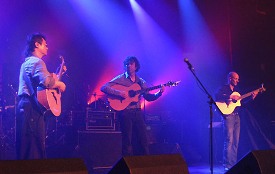 Musically we keep it fresh by adding some new pieces or some new element that gives us a challenge. For our most
recent tour we added a set featuring the classical guitar, something we haven't done before. On a personal level,
I enjoy tackling side projects during breaks from CGT tours (solo projects, collaboration with other musicians).
This always brings me back with new perspective and fresh ideas.
Musically we keep it fresh by adding some new pieces or some new element that gives us a challenge. For our most
recent tour we added a set featuring the classical guitar, something we haven't done before. On a personal level,
I enjoy tackling side projects during breaks from CGT tours (solo projects, collaboration with other musicians).
This always brings me back with new perspective and fresh ideas.
But mostly, our fans keep it fresh and exciting for us while we're on the road. It's rewarding to see people leave
our concerts with a big smile on their face. We must be doing something right!
Hideyo: I'm commuting from Japan each tour. Most of the time, it is a long flight and jet lag every time
which is tough, but being Japanese, I could rest in-between the tour in Japan, and that keeps me going.
Minor 7th: Robert Fripp stands out as a seminal influence in your musical experience. Other key influences?
Paul: Yes, having worked with Robert Fripp for many years, he is definitely a major influence. For me personally,
when I was a teenager, the guitarists that influenced me the most were: Alex Lifeson, Jimmy Page, Steve Howe,
David Gilmour and Brian May. I learned to play guitar by playing along with these players. As I grew older my
interests broadened and I began listening to all sorts of players, too many to list here, but one of my all
time favorites guitarists is Bill Frisell.
Bert: I taught myself how to play guitar by emulating blues solos (John Fogerty's long solo's on 'I Heard it
Through the Grapevine" and "Suzie Q" for instance), and was greatly influenced by hard rock guitarists (Ritchie
Blackmore), and of course: Jimi Hendrix.
I also studied classical guitar intensively for 6 years, and during that time I was constantly inspired by the
playing of Julian Bream. More recently I've been listening a lot to lute player Nigel North, and Belgian
violinst Sigiswald Kuyken-their renditions of Bach inspired me to record my own version of several Bach
Preludes on the steel string guitar on my CD Nascent, released just a few years ago. And there is a whole
new generation of great guitarists now; I just discovered the electric playing of Leo Abrahams (he's on
Brian Eno's latest release).
Hideyo: I started to learn the guitar when I played along the Ventures when I was 12. And I thought Nokie
Edwards is the best guitarist in the world at that age – well, I thought all the members of Ventures were
the best in the world, and I copied all their parts in many pieces. I think that's my base, in a good way
or not.
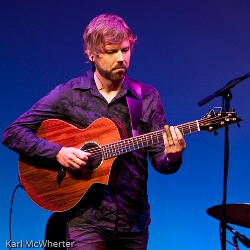 Minor 7th: Talk about the new recording, Andromeda. It seems to have bits of previous work, but
takes things in new directions. Was this a harder record to make? what elements of this CD are you
particularly excited about?
Minor 7th: Talk about the new recording, Andromeda. It seems to have bits of previous work, but
takes things in new directions. Was this a harder record to make? what elements of this CD are you
particularly excited about?
Paul: In some ways it was harder, and in some ways it was easier. The recording process is always a
challenge for us because none of us live in the same city. So we have to arrange recording when we
are all together, like at the end of a tour. We recorded this album in a studio on the upper floor of
a funeral home in Louisville KY. We recorded quite a few improvisations. Many of the improvisations
were a lot of fun and the music flowed. The difficulty was sorting through the recordings, finding
the parts that made the most sense to include on the album. And it can be a big challenge writing
music. Sometimes the ideas flow naturally, and other times it takes weeks/months/years for a piece
of music to develop to the point where we are happy with it. The title track we had been playing
live for almost 3 years before we finally got it recorded. I am particularly excited about the
combination of acoustic sounds and processed sounds we were able to get on this album. We recorded
the album on vintage analog recording equipment. Using only our acoustic guitars and some effects
to make the majority of sounds and textures you hear on this recording. Even the parts on this
recording that sound like they might be keyboard or synthesizer are actually modified acoustic guitars.
Bert: The new CD Andromeda consists of original CGT pieces, interspersed with improvised material. Though
we've done an album before with mostly originals, we've never released an album with only our own pieces.
In that way it's a milestone in CGT's career.
The album has been in the making for a few years, but the actual recording was very short: first session
was three days, and a few months later we returned to finish it in a day or two. The hard part was producing
and mixing: this is our first self-produced CD so we had to rely on our own sense of which direction we
wanted to go, instead of trusting a producer. That made things a little bit more difficult, but we were all
on the same page and made some good group decisions on where to take it next.
We did some initial mixes with engineer Kevin Ratterman, who recorded the album. But we still felt we needed
someone else to give it a different perspective. We then gave the sessions to Howard Givens who completed the
album. Howard gave the album a more 'acoustic' touch, and that's exactly what it needed.
During the recording sessions we included improvised takes, about two or three each day and we used the best
moments on the album. One of my favorite moments was when Kevin Ratterman, the sound engineer worked his
magic in the studio while we recorded the 'layered circulation' improv. We were in the other room listening
to his ideas and it was really exciting to hear it all come together. Like:'did we just play that? wow!'
Hideyo: The mixing step was hard, and Howard Givens did a very good job. The sound of recordings and live
performance are so different, a piece like "Andromeda" is more electric at live performance, and the recording
mixed with acoustic sound which make this album very interesting and exciting.
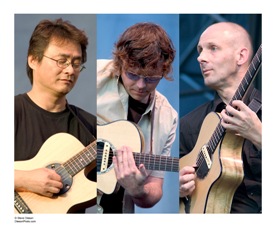 Minor 7th: How do you work out your parts when you compose or arrange? How do you balance individual
strengths or desires with group integration?
Minor 7th: How do you work out your parts when you compose or arrange? How do you balance individual
strengths or desires with group integration?
Paul: This is something that has always happened very naturally within the group. We often improvise on
ideas until all three of us are happy with each of our parts and the combination of parts. Sometimes we
might have suggestions for what the others might play, but mostly we come up with our own parts. Each of
us have our strengths and weaknesses, and we use these to our best advantage.
Bert: We're each well aware of our own strong and weak points as players. Rather than delegating the obvious
part to say, the soloist, or the rhythm player, we often mix things up a bit and challenge ourselves to step
out of our comfort zone. Saying that, Hideyo remains the groove master, and fast picker. Paul has a great
feel for rocking parts and sounds, and plays some mean slide guitar.
Hideyo: Since we've played together a long time, we know what is a good part for each member for the
arrangement, especially classical pieces. For composition, we come up with our own parts during the
long jam sessions where we find good idea. Most of time, it is obvious who plays what.
Minor 7th: How come only Paul and Bert blog on the website?
Paul: Hideyo contributes to the website with his road cam photos. He doesn't feel comfortable enough with
the English language to write a blog, so he takes pictures!
Bert: Assuming your native language is English, imagine trying to write a blog in Japanese...very tough!
I have lived in the US for 20 some years now and am quite comfortable with the language, as for Paul he's
American. For Hideyo there is a much larger language barrier, since he still lives in Japan and commutes to
the US just for the tours. Hideyo has a Roadcam page on the CGT site-he describes the days on the road with
photos, and has become very good at it too.
Hideyo: I'm doing the Roadcam page on the website. Taking 100's of photos each day for the Roadcam is hard
enough for me.
Minor 7th: You all now live in different cities on different continents. How does your cultural diversity contribute to and inform your music?
Paul: This is one of the things that makes the CGT unique. I'm not aware of any other band on the planet that
features a Belgian, a Utahn and a Japanese. Each of us grew up with very different cultural influence which
contribute significantly to the CGT. And obvious example is: on recent tours we have been playing some
traditional Koto music arranged by Hideyo.
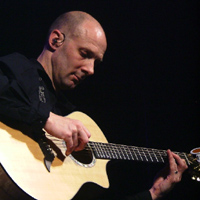 Bert: Each of us grew up in a different continent: myself in Europe, Paul in the USA and Hideyo in Japan.
Combine that with the fact that we started out in Los Angeles during our first five years together and you
have a lot of ingredients and qualities there. For instance: Hideyo brings in very unexpected arrangements
and original pieces - after all, he's the one who got us started playing surf tunes, which was an immediate
hit with the audience. He also arranged a lovely piece called Merry Christmas Mr Lawrence by Ryuichi Sakamoto,
something that we probably never would of thought of because it's so unusual and rooted in traditional
Japanese music. On our latest CD he's responsible for the main ideas of a tune called 'Hazardous Z', a very
different style of piece on this CD, but exactly the thing it needed! Paul, the American in the group has a
great sense of what sounds good right here and now. And he'll let you know if it sounds good or not, and he's
usually right. He is a great directive force when we write pieces together. He's a propeller of the group.
Bert: Each of us grew up in a different continent: myself in Europe, Paul in the USA and Hideyo in Japan.
Combine that with the fact that we started out in Los Angeles during our first five years together and you
have a lot of ingredients and qualities there. For instance: Hideyo brings in very unexpected arrangements
and original pieces - after all, he's the one who got us started playing surf tunes, which was an immediate
hit with the audience. He also arranged a lovely piece called Merry Christmas Mr Lawrence by Ryuichi Sakamoto,
something that we probably never would of thought of because it's so unusual and rooted in traditional
Japanese music. On our latest CD he's responsible for the main ideas of a tune called 'Hazardous Z', a very
different style of piece on this CD, but exactly the thing it needed! Paul, the American in the group has a
great sense of what sounds good right here and now. And he'll let you know if it sounds good or not, and he's
usually right. He is a great directive force when we write pieces together. He's a propeller of the group.
But there seems to be something in the group that is larger than just the sum of three guys from different
cultures. It's quite impossible to describe that, and it's just there that the magic happens.
Hideyo: A piece like "Rokudan" the Japanese traditional KOTO music we play is a good example of my contribution.
Also, there are contributions from each other, some are obvious, some not.
Minor 7th: You're touring again after the New Year through March. Any ideas for the next record?
Paul: Yes, we'll be touring in the USA in January, February and March. In May we head to South America and
later in the year we will be in Europe and Canada. We like to keep busy touring as much as possible. For
the next record, we have a few ideas. We are liking the idea of focusing on certain aspects of our playing.
Perhaps an all classical recording? Or a record of all surf guitar hits? We'll see.
Bert: Though we just released our new record, we're already bouncing ideas off each other : a collaboration CD
with other musicians, an all improvised CD, or a classical CD. We'll go with whatever resonates most with all
three of us.
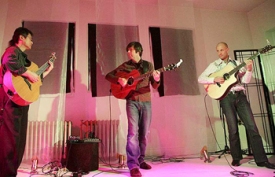 Hideyo: Since we did an "Original Album", the next one may only be a "Classical Album" or "Surf Album", or
"Mixed Album" perhaps.
Hideyo: Since we did an "Original Album", the next one may only be a "Classical Album" or "Surf Album", or
"Mixed Album" perhaps.
Minor 7th: For our gear heads, talk about your instruments
Paul: We've used many over the years. We like to experiment and try different guitars. We've been playing
Breedlove guitars for the past 5 or 6 years. Several years ago we played in Oregon near the Breedlove
facility, and some of their guys came to show. We went to the factory, and fell in love with the guitars
and the people making them. They are great to work with. They work well amplified. We have all played
guitars by Ervin Somogyi, which are wonderful instruments.
Bert: I just ordered a new custom guitar from Jason Bowerman – he used to work for Breedlove and he has opened
his own shop. I like his guitars a lot.
Minor 7th: You guys tour a lot, with a lot of traveling. Does it ever wear you down?
Paul: The thing that gets tiresome is constant traveling and staying in different hotels – after 28 years it's
hard sometimes. What keeps me going in the energy from the music. The last tour we went through some amazing
places, it was really beautiful, so the long drives aren't so tiring.
Bert: It can be totally exhausting. We have found a good balance in getting days off, sometimes we try to stay
an extra day in a nice place. We try to eat well.
Minor 7th: Talk about "Hazardous Z" – sounds like some Chick Corea in his Spanish phase.
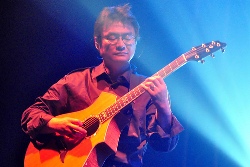 Paul: Hideyo wrote the main ideas in Japan with a guy named Yuta Saito. Initially it didn't have much of a
Spanish flavor. It wasn't until Bert and I got a hold of it, and it seemed to naturally go there. One of the
things that triggered it was when I was listening to Last FM and I heard a heavy flamenco tune by Tony Levin
playing with Steve Stevens. I talked to Steve and learned he has really been into flamenco. So we got some
other ideas, and Bert pulled out his nylon stringed and it took off.
Paul: Hideyo wrote the main ideas in Japan with a guy named Yuta Saito. Initially it didn't have much of a
Spanish flavor. It wasn't until Bert and I got a hold of it, and it seemed to naturally go there. One of the
things that triggered it was when I was listening to Last FM and I heard a heavy flamenco tune by Tony Levin
playing with Steve Stevens. I talked to Steve and learned he has really been into flamenco. So we got some
other ideas, and Bert pulled out his nylon stringed and it took off.
Bert: My first ideas were distorted electric guitar, and Paul wasn't too keen on that.
Minor 7th: You have 4 tunes on the new CD title "Improv" – just how much structure is set, and how much are you
guys interacting as you go?
Paul: There are some basic ideas on some of them before we start recording – like on "Improv VIII -
Layered Circulation" – we had the key. We recorded a few layers, and our recording engineer thought of
slowing it down to half speed (like Les Paul did). Then that gave us some other ideas as well.
Bert: Some of the other songs are rudimentary with just 3 of 4 chords, and we'd start there, and take off
from there. Improv VII we just turned on the recorder.
Minor 7th: Do you do most of your writing individually and share over emails, or when you're together?
Paul: It's a combination, really. We send stuff to each other, and then work things out when we are
in the studio.
Bert: The real magic happens when we are together. Most of the songs were written together while we were in
the same room.
Minor 7th: Tell us about the personalities in the band. Who's the crazy one?
Paul: Me. We call Hideyo the oldest and the wisest he's the Zen master – we look to him if we have some
difficult issues we need to resolve.
Bert: We have 3 totally different personalities, and with our cultural backgrounds, that makes us very
diverse. Paul adds an openness to the group. Hideyo has a great sense of humor and that comes out in the music.
© 2010
Kirk Albrecht
Here's a partial discography for The California Guitar Trio:
Home | Links | Podcast | Archives | Submissions | Free CD Giveaway | Subscribe
 Musically we keep it fresh by adding some new pieces or some new element that gives us a challenge. For our most
recent tour we added a set featuring the classical guitar, something we haven't done before. On a personal level,
I enjoy tackling side projects during breaks from CGT tours (solo projects, collaboration with other musicians).
This always brings me back with new perspective and fresh ideas.
Musically we keep it fresh by adding some new pieces or some new element that gives us a challenge. For our most
recent tour we added a set featuring the classical guitar, something we haven't done before. On a personal level,
I enjoy tackling side projects during breaks from CGT tours (solo projects, collaboration with other musicians).
This always brings me back with new perspective and fresh ideas. Minor 7th: Talk about the new recording, Andromeda. It seems to have bits of previous work, but
takes things in new directions. Was this a harder record to make? what elements of this CD are you
particularly excited about?
Minor 7th: Talk about the new recording, Andromeda. It seems to have bits of previous work, but
takes things in new directions. Was this a harder record to make? what elements of this CD are you
particularly excited about? Minor 7th: How do you work out your parts when you compose or arrange? How do you balance individual
strengths or desires with group integration?
Minor 7th: How do you work out your parts when you compose or arrange? How do you balance individual
strengths or desires with group integration? Bert: Each of us grew up in a different continent: myself in Europe, Paul in the USA and Hideyo in Japan.
Combine that with the fact that we started out in Los Angeles during our first five years together and you
have a lot of ingredients and qualities there. For instance: Hideyo brings in very unexpected arrangements
and original pieces - after all, he's the one who got us started playing surf tunes, which was an immediate
hit with the audience. He also arranged a lovely piece called Merry Christmas Mr Lawrence by Ryuichi Sakamoto,
something that we probably never would of thought of because it's so unusual and rooted in traditional
Japanese music. On our latest CD he's responsible for the main ideas of a tune called 'Hazardous Z', a very
different style of piece on this CD, but exactly the thing it needed! Paul, the American in the group has a
great sense of what sounds good right here and now. And he'll let you know if it sounds good or not, and he's
usually right. He is a great directive force when we write pieces together. He's a propeller of the group.
Bert: Each of us grew up in a different continent: myself in Europe, Paul in the USA and Hideyo in Japan.
Combine that with the fact that we started out in Los Angeles during our first five years together and you
have a lot of ingredients and qualities there. For instance: Hideyo brings in very unexpected arrangements
and original pieces - after all, he's the one who got us started playing surf tunes, which was an immediate
hit with the audience. He also arranged a lovely piece called Merry Christmas Mr Lawrence by Ryuichi Sakamoto,
something that we probably never would of thought of because it's so unusual and rooted in traditional
Japanese music. On our latest CD he's responsible for the main ideas of a tune called 'Hazardous Z', a very
different style of piece on this CD, but exactly the thing it needed! Paul, the American in the group has a
great sense of what sounds good right here and now. And he'll let you know if it sounds good or not, and he's
usually right. He is a great directive force when we write pieces together. He's a propeller of the group. Hideyo: Since we did an "Original Album", the next one may only be a "Classical Album" or "Surf Album", or
"Mixed Album" perhaps.
Hideyo: Since we did an "Original Album", the next one may only be a "Classical Album" or "Surf Album", or
"Mixed Album" perhaps. Paul: Hideyo wrote the main ideas in Japan with a guy named Yuta Saito. Initially it didn't have much of a
Spanish flavor. It wasn't until Bert and I got a hold of it, and it seemed to naturally go there. One of the
things that triggered it was when I was listening to Last FM and I heard a heavy flamenco tune by Tony Levin
playing with Steve Stevens. I talked to Steve and learned he has really been into flamenco. So we got some
other ideas, and Bert pulled out his nylon stringed and it took off.
Paul: Hideyo wrote the main ideas in Japan with a guy named Yuta Saito. Initially it didn't have much of a
Spanish flavor. It wasn't until Bert and I got a hold of it, and it seemed to naturally go there. One of the
things that triggered it was when I was listening to Last FM and I heard a heavy flamenco tune by Tony Levin
playing with Steve Stevens. I talked to Steve and learned he has really been into flamenco. So we got some
other ideas, and Bert pulled out his nylon stringed and it took off.